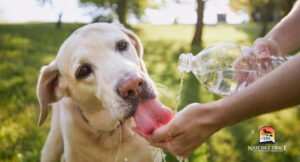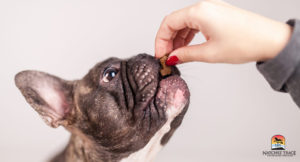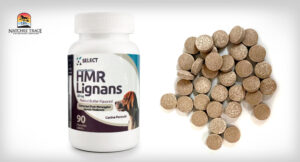If you share your life with a dog, you know they’re more than a pet—they’re family. That’s why it’s so important to be aware of health issues that could affect their well-being, like Cushing’s disease in dogs.
Cushing’s disease happens when your dog’s body produces too much cortisol—a hormone that helps them cope with stress but can cause harm in excess. Several different factors can cause cortisol overproduction. It could be caused by tumors on the pituitary or adrenal glands, or sometimes from long-term use of certain medications.
When untreated, Cushing’s disease can lead to symptoms that affect your dog’s comfort and quality of life, such as:
- Increased thirst and urination
- Weight gain and a pot-bellied appearance
- Thinning hair or hair loss
- Low energy and fatigue
Recognizing the signs early and seeking prompt veterinary care can make a world of difference. With the right treatment plan and ongoing support from your veterinarian, your dog can feel better, stay active, and enjoy a happier, healthier life by your side.
What is Cushing’s Disease in dogs?
When a dog has Cushing’s disease, the adrenal glands go into overdrive, producing an excess of hormones, most notably cortisol. While cortisol plays a vital role in helping the body respond to stress, too much of it can throw your dog’s entire system out of balance.
Cushing’s disease is most often seen in middle-aged to senior dogs, and because its symptoms can mimic those of other illnesses, it can be challenging to diagnose. That’s why awareness is so important.
You might notice changes such as:
- Increased hunger, thirst, and urination
- Heavy or frequent panting
- A “pot-bellied” appearance
- Unexplained weight gain or obesity
- Extra fat deposits on the neck and shoulders
- Thinning hair or patches of hair loss
- Reduced energy or reluctance to exercise
These signs often develop gradually, so it’s easy to mistake them for normal aging. But when you’re aware of what to watch for, you can take action sooner. Early diagnosis and treatment can help manage symptoms, restore comfort, and give your dog the best chance at staying healthy and happy for years to come.
What is Atypical Cushing’s Disease in Dogs?
 Atypical Cushing’s Disease in dogs can be especially frustrating for both pet parents and veterinarians. It causes the exact same symptoms as typical Cushing’s disease—yet standard blood tests don’t show the usual spike in cortisol levels.
Atypical Cushing’s Disease in dogs can be especially frustrating for both pet parents and veterinarians. It causes the exact same symptoms as typical Cushing’s disease—yet standard blood tests don’t show the usual spike in cortisol levels.
Instead, the adrenal glands produce excess amounts of intermediate adrenal steroids, often referred to as “sex steroids” (such as estradiol, progesterone, and androstenedione). While these hormones differ from cortisol, they can still disrupt the body’s balance and trigger the same symptoms previously explained.
Because standard Cushing’s tests focus on cortisol levels, atypical Cushing’s often goes undiagnosed at first. This can lead to confusion, delays in treatment, and frustration for everyone involved.
The good news? Hope exists. We can help you develop a treatment plan that helps restore your dog’s comfort, energy, and overall quality of life.
Natural Treatment for Cushing’s Disease and Atypical Cushing’s Disease
Melatonin and lignans work beautifully together as a safe, natural option for supporting dogs with both Cushing’s and Atypical Cushing’s disease.
Melatonin helps regulate the adrenal glands and reduce the overproduction of certain hormones, while lignans (natural plant compounds) help block excessive steroid production. When used together, they can gently guide your dog’s system back toward balance, easing symptoms and improving overall well-being.
Many of our clients love this approach because it’s non-invasive and scientifically supported. Dr. Smith usually recommends melatonin and lignans first, and often the dogs do so well that they don’t even need medication. Over time, dogs taking melatonin and lignans experience better energy, healthier coats, and a happier, more comfortable life.
However, melatonin and lignans can also be used in conjunction with other medical treatments. If your dog is already on medication, Dr. Smith may be able to help you develop a plan to wean your dog off it using melatonin and lignans. And if Cushing’s gradually progresses as the dog ages, medication can be reintroduced, possibly in lower doses.
Best of all, both melatonin and lignans are readily available at TCVM Pet Supply, so you can get started right away with high-quality, vet-approved products you can trust.
Melatonin
Melatonin is more than just a sleep aid! It plays a vital role in balancing hormones and may even help slow the growth of certain tumors. In dogs with Cushing’s or Atypical Cushing’s disease, melatonin can help regulate adrenal gland function and reduce the overproduction of problematic hormones, leading to improved energy, a healthier haircoat, and better overall wellness.
General dosing guidelines for melatonin in dogs:
- Dogs under 10 lbs: 1 mg every 12 hours (also appropriate for very low-dose use in sensitive dogs)
- Dogs under 30 lbs: 3 mg every 12 hours
- Dogs over 30 lbs: 6 mg every 12 hours
Important notes:
- Do not exceed 3–6 mg every 8–12 hours unless directed by your veterinarian.
- Always read the label carefully and choose supplements containing melatonin only—no added sweeteners, xylitol, colorings, or unnecessary additives, as these can be harmful.
- If melatonin causes excessive drowsiness, give it only at night to help your dog rest comfortably.
- While generally safe, melatonin can interact with certain medications, so it’s best to check with your veterinarian before starting supplementation.
By following the correct dosage and choosing a pure, high-quality product, you can use melatonin as a natural way to help your dog feel more balanced, relaxed, and healthy.
Lignans

Lignans are natural plant compounds found in flaxseed hulls and certain other plants. They’re beneficial for dogs with Cushing’s disease or Atypical Cushing’s because they help block the overproduction of steroid hormones, including the “sex steroids” that can cause symptoms in atypical cases. By lowering these excess hormone levels, lignans can support a healthier coat, reduce excessive thirst and hunger, and improve your dog’s overall comfort.
The University of Tennessee College of Veterinary Medicine (one of the leading research centers for canine Cushing’s)recommends the following lignan dosages:
- SDG flax hull lignans – 1 mg per pound of body weight daily
- HMR lignans – Total daily dose of 10 mg–40 mg (for small to large dogs)
Tips for best results:
- Choose high-quality, purified lignan supplements to ensure potency and safety.
- HMR lignans are often preferred for their higher bioavailability, but SDG lignans from flax hulls are also practical and well-tolerated.
- Lignans can be given with food to improve absorption and minimize digestive upset.
- For best results, lignans are often paired with melatonin as part of an integrated, natural approach to managing Cushing’s symptoms.
By adding lignans to your dog’s care plan, you can take a safe, research-backed step toward balancing hormones naturally and helping your dog feel healthier and happier.
Conclusion
In conclusion, being aware of potential health issues like Cushing’s disease in dogs is one of the most important responsibilities you have as a pet parent.
Cushing’s can cause symptoms such as excessive thirst and urination, weight gain, hair loss, lethargy, and changes in body shape. And, it can significantly affect your dog’s comfort and quality of life if left untreated.
The good news is that early detection and proper management can make all the difference. Many dogs with Cushing’s, whether typical or atypical, go on to live happy, active, and healthy lives with the right care.
Natural options, such as melatonin and lignans, can play a valuable role in supporting hormone balance and alleviating symptoms. Melatonin and lignans are safe, well-tolerated, and research-supported.
If you notice any signs of Cushing’s disease or suspect Atypical Cushing’s, the first step is to consult your veterinarian. With accurate diagnosis, a personalized treatment plan, and ongoing support, you can give your dog the best chance at a long, healthy, and joyful life by your side.
Looking for natural options for Cushing’s disease in dogs? Contact Dr. Smith right now.







